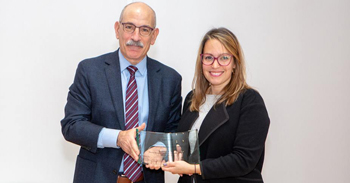Q&A: Meet this year’s International Keenan Lecturer, Dr. Galit Alter

By Christina Ting

Dr. Ori Rotstein (left) and Dr. Galit Alter.
The International Keenan Lectureship was hosted this year on Nov 26th 2018. Running in its third year, this annual lectureship has been established by the Keenan Family and allows the Keenan Research Centre for Biomedical Science to bring world-renowned experts to the centre. Each year one individual is invited who is an outstanding researcher and has contributed significantly to their field. The hope is that these lectureships will allow us to learn more from experts in their field of research, foster potential collaborations in future work and enrich our research community as a whole.
This year, the International Keenan Lecturer was Dr. Galit Alter, Professor of Medicine at the Ragon Institute of Massachusetts General Hospital, MIT and Harvard. Dr. Alter received her PhD in Experimental Medicine from McGill University and performed her post-doctoral at the Massachusetts General Hospital. She leads a laboratory with the single goal of developing novel vaccine approaches.
In order to understand her research better and find out what drives her passion in this area, we sat down with Dr. Alter to ask her elaborate few questions.
Can you please tell us a bit about your research?
My research focuses on looking deeper at the immune response. Like many pathogens, our immune system has the capacity to diversify with incredible speed, which enables our defenses to theoretically stay one step ahead of any pathogen that hits the system.
But sometimes pathogens come around that can subvert even our most sophisticated immune responses, such as HIV, influenza, Ebola, malaria, tuberculosis, and many others. Yet, even among those that become infected with these devastatingly lethal pathogens, a few individuals are able to generate just the right immune response to overcome the disease.
Developing tools that capture the remarkable variability that can arise in the immune response to infection, and specifically what allows some individuals to resist disease, may help provide hints related to the path to “protection.” My lab focuses on the development of these tools that help us understand protective immune responses to guide next generation vaccine or therapeutic design to win the battle against infection.
What are some exciting projects you currently have going on in your lab?
We have recently unraveled the path to the development of universal influenza specific immunity. With the ever looming threat of pandemic flu, a better understanding of how influenza specific immunity evolves is key to protecting millions or billions of individuals from this lethal threat.
Where do you think your research will have/has had the largest impact?
My research aims to allow us to look at the immunity in a whole new way. Instead of the pre-existing dogma that suggests that neutralizing antibodies, which are able to block the initial infection, are the most important antibodies we generate to prevent infectious diseases, these new tools now allow us to understand that other antibody functions are far more relevant against infection. Moreover, the platform tool now allows us to dissect the humoral immune response against nearly any pathogen and more recently even against any tumors. The platform has been transformative in providing a means to dissect the humoral immune responses against a much broader array of diseases.
What is something that you wish more people knew about our innate immune response or vaccination in general?
It is programmable! Although most think that the innate immune response is non-specific, antibodies provide innate immunity with specificity. In fact, all innate immune cells are decorated with Fc-receptors, enabling them to respond to any antibody-opsonized material.
Why did you agree to be the 2018 Keenan International Lecturer?
It was a great honor to be invited to lecture at the Keenan International Lecture. In addition, it is always a great privilege to have the chance to come home and see the wonderful infectious disease and immunology communities at St. Michael’s hospital and UofT. As a Torontonian- there is no greater pleasure and honor to be invited home to speak of my work.
How does your research change lives?
Our research changes lives because it helps us understand how the immune system protects us against virtually any infectious disease of interest. Using this information, we are armed to begin to develop more effective vaccines or medicines to block the devastation caused by these diseases.
About St. Michael’s Hospital
St. Michael’s Hospital provides compassionate care to all who enter its doors. The hospital also provides outstanding medical education to future health care professionals in more than 29 academic disciplines. Critical care and trauma, heart disease, neurosurgery, diabetes, cancer care, care of the homeless and global health are among the Hospital’s recognized areas of expertise. Through the Keenan Research Centre and the Li Ka Shing International Healthcare Education Centre, which make up the Li Ka Shing Knowledge Institute, research and education at St. Michael’s Hospital are recognized and make an impact around the world. Founded in 1892, the hospital is fully affiliated with the University of Toronto.
About Unity Health Toronto
Unity Health Toronto, comprised of Providence Healthcare, St. Joseph’s Health Centre and St. Michael’s Hospital, works to advance the health of everyone in our urban communities and beyond. Our health network serves patients, residents and clients across the full spectrum of care, spanning primary care, secondary community care, tertiary and quaternary care services to post-acute through rehabilitation, palliative care and long-term care, while investing in world-class research and education. For more information, visit www.unityhealth.to.
